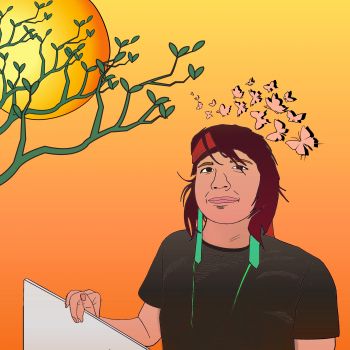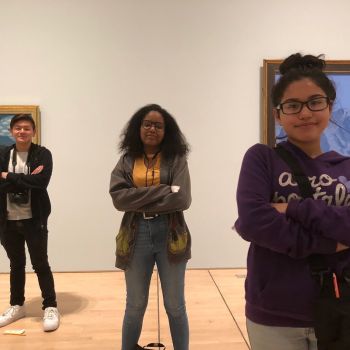Respect & Social Status

5 Facts About Our Need to Feel Respected During Adolescence
During adolescence, changes in our social contexts as we transition to middle and high school combine with physical and cognitive development in ways that increase our sensitivity to belonging and earning respect from those around us.
This heightened attention to our place in the social world motivates us to learn the skills we need to adapt to the more complex social demands of adulthood. It also amplifies the impact of feeling disrespected, excluded, or given messages that we don’t belong—including through experiences of racism, bias, and other forms of discrimination or harassment.
As adolescents, we’re motivated to earn prestige and social standing from those around us. To ensure that youth can channel this motivation in healthy ways, adults need to ensure that young people have ample positive pathways to gain respect and approval from the adults and peers around them.
What the research says about the need for respect and social status during adolescence:
- During adolescence, our maturing brains and changing hormones increase our attention to social status and make positive attention feel more rewarding. These changes motivate us to tune in to the social world in ways that help us learn skills to navigate adulthood.
- Programs that give us positive ways to earn respect appear to be more effective during our mid-adolescent years.
- Experiences that make us feel disrespected, including racism, discrimination, and other forms of exclusion, are amplified when we’re adolescents. Efforts to eliminate or lessen exposure to racism, bias, and bullying are especially important in the adolescent years.
- As adults, we need to find ways to channel youths’ need for respect and admiration into positive activities that help young people find a meaningful place in the world.
Physical, cognitive, and social changes in adolescence combine to make us more sensitive to feelings of status and respect and to where we belong in our social worlds. This sensitivity is developmentally important. It motivates us to pay attention to our social environments in ways that help us learn to adapt to the more complex social demands of adulthood.
At the beginning of puberty, around 10 to 13 years old, levels of testosterone increase in both boys and girls and heighten our attention to social status. Around the same time, maturational processes in the brain help us understand the perspectives of others in ways that build empathy, but also increase self-consciousness when we think we’re being socially evaluated. MRI imaging shows increased activity in the areas of the brain associated with reward processing when we’re evaluating our own social standing. Feeling rewarded from positive attention appears to peak in adolescence, motivating us to find ways to earn approval from those around us.
Youth-serving programs that incorporate opportunities to earn respect and status appear to be more effective during our adolescent years. Relationships and environments that provide empathy, support, and positive pathways to earn status can improve academic motivation and increase the effectiveness of health interventions aimed at young people.
The flip side of our increased sensitivity to social reward is the pain of being disrespected or socially rejected. Research indicates that when we feel as though we are being excluded by peers, we report greater distress and show greater activity in a brain region associated with higher levels of depression in general.
Experiences that make us feel disrespected or treated as though we don’t belong thus become powerful social threats. The negative effects of racism, discrimination, and other forms of exclusion are amplified when we’re adolescents–making efforts to eliminate or at least mitigate exposure to racism and bias for youth especially important.
Youth are seeking ways to earn respect and admiration. As adults supporting young people, we need to provide ample positive pathways for youth to gain prestige and positive social standing within their communities, to earn respect from the adults and peers around them, and to find a meaningful place in the social world.
During adolescence, we want to be respected, and we feel respected when we’re treated as though we’re competent and have agency and autonomy. How can programs work with these desires to increase their effectiveness with this age group?
What the research says about programs to support our need to take positive risks during adolescence:
- When programs support adolescents’ desire for autonomy and respect, they are more effective in delivering their messages.
- Youth-led research programs can not only promote adolescents’ feelings of being respected, they can also benefit youths’ health.
- Tailoring program messaging in a way that respects youths’ perspectives and targets their desire for social standing may boost the program’s effects.
- Programs that work to ensure that youth feel respected as autonomous individuals appear to be most effective in the middle school years.
What We Know
Traditional interventions aimed at changing youths’ behavior often involve activities or lectures where adults tell adolescents how they should behave and discuss the consequences of risky or unhealthy behaviors. But youth often already understand the consequences of their actions and such messaging can feel to young people as though adults are talking down to them. It’s not surprising then that such programs often fail to change those actions. Instead, identifying the underlying motivation for youths’ behavior and creating interventions that invite–rather than tell–adolescents to examine how their actions affect their health and future may be more impactful, particularly for middle school–aged youth.
Preliminary evidence suggests that when programs support adolescents’ desire for autonomy and respect, they are more effective in delivering their messages. For example, the Teen Outreach Program found that when middle school students felt that the program facilitators listened to what they had to say and treated them like competent, independent individuals, they showed greater benefits from the program, including reduced number of suspensions and lower pregnancy rates. On the contrary, program effects were lower for youth who felt that the facilitators made all the decisions and didn’t respect their autonomy.
Incorporating respect for adolescents’ values and desire for social status into program messaging can be a way to boost program effectiveness. Highlighting this, a healthy eating intervention for eighth graders found that reframing healthy eating as a way to be socially conscious was effective in reducing unhealthy snacking, and the results persisted for boys even three months after the intervention. Youth in this healthy eating program weren’t lectured by adults on healthy eating–instead they were asked to read articles exposing deceptive marketing practices of food organizations. Participants were also shown purported survey results and quotes from older students who expressed outrage at the manipulation and planned to “fight back” by limiting their intake of unhealthy foods. By creating a context that respected young people’s autonomy and conveyed that higher status (that is, older) students were choosing to eat healthier, researchers were able to positively influence their behavior.
Youth-led participatory action research (YPAR) programs can directly promote adolescents’ sense of agency and their feeling of being respected within their communities. In these programs, youth identify an issue within their school or community and collaborate with researchers to collect data on that issue. Youth then use findings from their research to suggest potential solutions and advocate for change. These programs can be effective ways to make adolescents’ feel that their ideas are respected by the adults around them.
For example, in the Bridges Project, middle school students researched topics that had direct impacts on their communities, such as police brutality, lack of green spaces, food deserts, and discrimination against LGBTQ+ people. Adolescents who participated in the program were more likely to say their voices were heard and felt more supported by adults.
Youth-led research can not only promote adolescents’ feelings of being respected, it can also benefit youths’ health. For example, middle schoolers participating in the Healthy Youth Places (HYP) intervention worked with adults to spread awareness about the importance of physical activity and proper nutrition at school. The program significantly increased physical activity among adolescents at participating schools, highlighting the potential for YPAR projects to influence real change in adolescent health.
What Do We Still Need to Know?
There still isn’t enough research to say definitively how programs should design their messaging to be most effective for youth. However, emerging research suggests that tailoring program messaging in a way that respects youths’ perspectives and targets their desire for social standing may boost a program’s effects.
Additionally, while youth-led research programs are promising avenues for promoting adolescents’ sense of status and respect, there is more we need to understand about how to maximize the effectiveness of these programs. YPAR research is often only descriptive or qualitative in nature, with few randomized, controlled trials. Random selection of participants and use of comparison groups can help researchers understand the specific causes of the program’s effects. A delayed-treatment approach, where youth are randomly selected to participate at either an earlier or later time point could provide a control group for comparison while still offering all participants the opportunity to benefit from youth-led research.
Healthy Eating
A healthy eating intervention developed by psychologist Dr. Christopher Bryan and colleagues encouraged eighth graders to reconsider their eating choices after learning about manipulative practices by the food industry. Youth read articles that described industry practices that make unhealthy food addictive to youth and discussed how food companies profit from young people not understanding the health consequences of consuming their products. They also read quotes from older adolescents who vowed to limit unhealthy snacks to protest against food companies who engage in harmful practices. In doing so, program facilitators reframed healthy eating as a way for adolescents to gain status, feel in control of their decisions, and protect themselves against industries that underestimate their competence.
Three months after the intervention, boys who participated chose fewer unhealthy drinks and snacks than those in a control condition, suggesting the program was able to increase healthy eating practices. Future research is needed to assess the potential long-term effects that such programs may have on adolescents’ health behaviors.
The Bridges Project
The Bridges Project is a drop-in community academic enrichment program for youth living in public housing. In response to falling enrollment numbers among middle schoolers, program facilitators developed the Youth Engaged in Leadership and Learning (YELL) curriculum, a youth-led research program aimed at increasing engagement while supporting youths’ desire for independence.
Participants conducted research projects on issues of importance to their community. For example, one youth-led project involved collecting field notes about green spaces and food outlets in their local community.
Youth then used this information to advocate for and initiate a community garden in their neighborhood. Youth who participated in the YPAR program were more likely to report that their voices were heard by the program staff and felt that staff cared about their ideas, suggesting that youth-led research programs may help adolescents feel respected.
Healthy Youth Places
Healthy Youth Places (HYP) is an intervention focused on increasing middle school students’ fruit and vegetable intake and physical activity by building leadership and change skills. In this multi-school program, youth-led school advocacy groups or “change teams” worked with program facilitators to increase students’ awareness of the importance of good nutrition and physical activity for health. Students learned community change skills such as teamwork, collaboration, communication, and marketing.
After the intervention, participating students showed significant increases in physical activity, but not fruit and vegetable intake. Analysis of the study data suggested that adolescents’ confidence in their ability to get others to act on their interests (in this case, their confidence in their ability to get program staff to create opportunities for physical activity) were key to the programs’ effectiveness. HYP provides evidence that providing the opportunity for youth to be involved in community projects, with the support of adults, can be an effective way to promote positive outcomes while respecting youths’ autonomy.
Additional Resources

Resources | February 27, 2025
5 Fast Facts About Peer Relationships and Friendships During Adolescence




